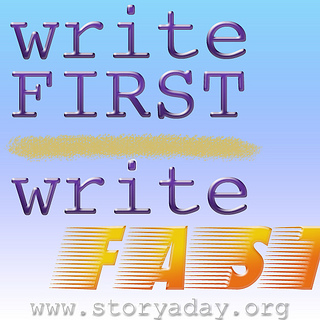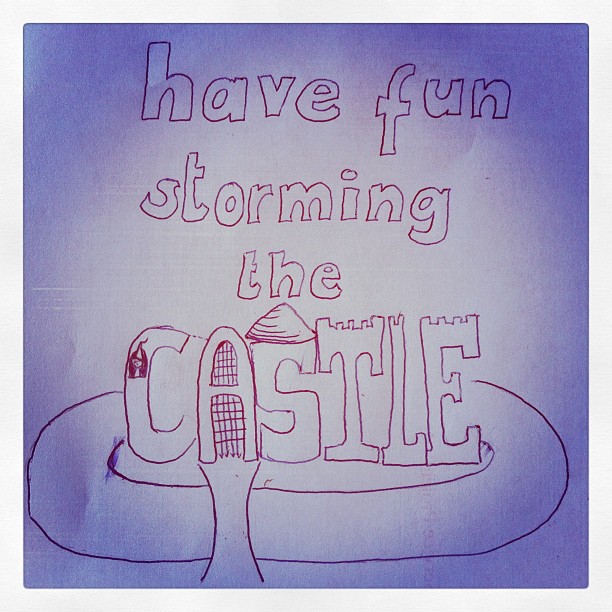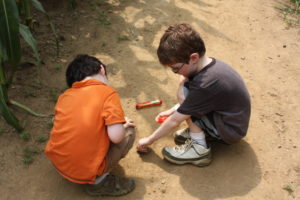Last week we talked about the importance of writing even when you don’t feel like it. Well, enough theory. This week I bring you seven practical strategies for making it happen.
Goals, rewards and accountability buddies form part of the big picture in this scheme. They are sensible parts of your writing’s career plan. But as for the actual “starting writing” part? That’s when you need to be a bit more tricksy.
Try some of these tricks to shake loose the “sensible”, lose the “logical” and get your brain into that devil-may-care creative zone you need for writing.
1. Give Yourself Enough Time
I’ve always loved a deadline — as long as it came with a sleepless night between the two of us. But sit down to write knowing I have to have something completed in an hour?! That’s enough to induce a mammoth case of writer’s block (aka panic). Comedian John Cleese talks about this in this fabulous video on creativity (it’s long, but worth watching). He recommends no less than 90 minutes as a window for creative work, asserting that your brain will try to sabotage you for at least the first half hour…It’s not a hard and fast rule, but it does point out the necessity of allowing more time than you might otherwise plan, for creative ventures.
2. Letter To a Friend
If you’re really having trouble knowing how to get into your story, put all thoughts of readers, editors and publishing out of your head. Instead start writing a letter to your best friend, explaining what this story is going to be about. Write it as if you were describing something that had really happened. You don’t need to finish the letter (or mail it) because the act of writing it out will help you find a way into the actual story, and start writing.
3. Switch Up Your Writing Method
If you usually write on a computer, try turning on the microphone and dictating your story instead (you can transcribe it later). If you usually dictate stories, grab a good pen and some nice paper and write a few paragraphs. If you habitually write on paper, pull up a keyboard. Just the act of writing in a different physical way forces your brain to fire in different ways. You may find yourself “writing” in a different style than usual, or you may simply jump start your writing day. (This will feel awkward. That’s kind of the point. Try it.)
4. Stand Up
Sitting down is not a natural attitude, in evolutionary terms. Humans are made to be upright, to be walking around. So stand up for a while. Pace the floor, muttering like a mad person about the plot point that has you foxed. If you can swing it, put a plank across the arms of a treadmill and balance your laptop on it (I recommend walking very, very slowly until you get the hang of this). Either way, regular movement-breaks help you write by getting your blood pumping and letting your mind wander. Creativity requires thinking-time as well as working-time.
5. Write Nonsense
Some days getting started feels like torture. It feels like a physical impossibility. Put your pen on the paper, put your fingers on the keyboard and just talk. Talk about anything. How hard this is, how much you hate it, what sounds you are hearing outside your window, the feeling of your hair sticking to your neck in the summer heat, anything. Eventually you will relax (and get sick of the navel-gazing, self-absorbed, pity-kitty you have become and start writing the damned story).
6. Outline one scene
Every story has scenes. The bit where we walk in to the characters’ lives. The bit where they are forced to make a decision. The bit when they have a big fight. Take one scene and outline it. Promise yourself that you’ll write this one scene today even if you don’t manage anything else. Figure out who is in the scene, where it takes place, what the characters want, why they can’t have it (yet) and what function the scene plays in the overall scheme of the story (is it a set-up scene? Does it contain the inciting incident? Is it the climax?). Don’t worry about how you’ll write the rest of the story. Outline this one scene. Then write it.
7. Visualize Success
This is the most hippy, nebulous piece of advice I will give and its a bit more ’big picture’ than the other techniques here, but used in conjunction with them it can be extremely powerful. We are a product of our beliefs about ourselves, so let’s make sure we spend some time on the positive ones. Yes, writing is hard. No, we’re not big successes yet. So why do we do this to ourselves? What do we want? Answer this question then spend some time imagining how it will feel when you get there. Use those anticipated good feelings to propel you towards your goal.
Your goal might be as grand as seeing yourself doing book signings and readers to adoring fans. Or it might be as simple as remembering the thrill you always feel when you finish a piece.
And remember, you’re a writer. It is your job to imagine things all the time. If MBA candidates and captains of industry can use this technique, how much more successful will you, a writer, be?
—
What techniques do you use to jump start your work on a day when you don’t feel like writing?
Need more help jump-starting your writing day? Check out the ebook: The StoryADay.org Guide To Breaking Writers’ Block

























